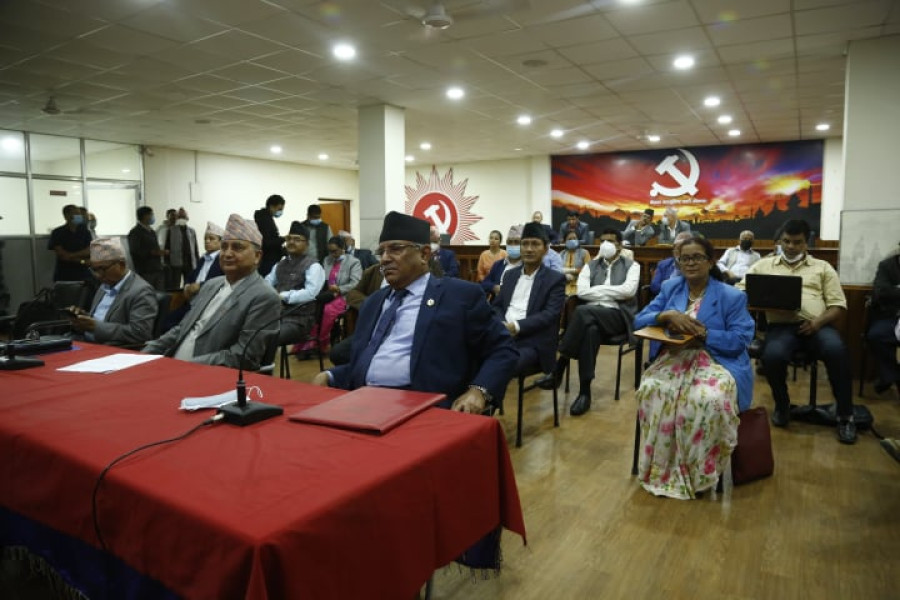Politics
Ruling party’s virtual meeting with the Chinese Communist Party draws widespread criticism for being ill-timed
Politicians say that such meetings at a time of heightened tensions between India and China will raise questions about Nepal’s commitment to its own non-aligned foreign policy.
Anil Giri
A one-day virtual workshop held between the communist parties of Nepal and China has drawn widespread criticism from both ruling and opposition leaders for coming at a time when relations between India and China are at a critical juncture after a violent clash along the disputed border in Ladakh.
The virtual meeting, organised by the Nepal Communist Party (NCP)’s School Department led by Deputy Prime Minister Ishwar Pokharel, drew even more condemnation after the party’s Foreign Affairs Department said that it was unaware of the meeting.
“The department did not know about it and this is not the right time to hold such a meeting,” Surendra Karki, deputy chief of the party’s foreign department, told the Post.
“There is tension at the India-China border but we are holding a meeting with one of the conflicting parties. We have upheld the policy of non-alignment and peaceful diplomacy, but such activities will harm our credibility.”
A large section of top party leadership skipped the meeting, including Prime Minister KP Sharma Oli, former prime ministers Madhav Kumar Nepal and Jhala Nath Khanal, party vice-chair Bamdev Gautam, party General Secretary Bishnu Poudel, and party spokesperson Narayan Kaji Shrestha. Nepal, who heads the Foreign Affairs Department, only received an invitation on Thursday evening and refused to attend, according to an aide to Nepal.
Party co-chair and former prime minister Pushpa Kamal Dahal, however, was the chief guest at the virtual workshop. At the meeting, Dahal said that Nepal will not accept any foreign assistance if there is any military or security interest attached or if any provisions contradict the constitution of Nepal.
Dahal was referring to the ongoing controversy over the $500 million Millenium Challenge Corporation Compact that some have alleged is closely linked to the US’ Indo-Pacific Strategy and its military components.
Several US officials and the US Embassy in Kathmandu have maintained that everything the US does in the region is part of the Indo-Pacific Strategy but that the strategy is a broad plan that is not directed at any particular country.
At the meeting, Dahal expressed satisfaction over Nepal’s participation in the Belt and Road Initiative, Chinese President Xi Jinping’s flagship project.
Beduram Bhusal, deputy chief of the party’s School Department, said that the workshop had been planned long before the violent Monday clash between the Indian and Chinese troops in the Galwan Valley in eastern Ladakh. The skirmish left at least 20 Indian soldiers dead while casualties on the Chinese side are unknown.
“We extended greetings to the Chinese side for 99 years since the establishment of the Chinese Communist Party and 65 years since the establishment of Nepal-China ties,” said Bhusal. “We ran a video message from our top leaders and they showed a video on how Tibet has developed in the last 70 years.”
Though ruling party leaders maintained that the symposium was aimed at learning from China’s ruling party—particularly on functioning and discipline—many, especially in the opposition, believe it was a poorly timed event and could send a wrong message.
Nepali Congress leader and former state minister Udaya Sumsher Rana said that bilateral relations between two nations should be conducted by the two governments.
“But in the case of Nepal and China, the two ruling communist parties seem to be dictating the governments, on similar lines as China's relations with Cuba and North Korea,” said Rana. “Clubbing the party and the government’s policies together is unprecedented and dangerous.”
The meeting between the two ruling parties comes amidst heightened tensions between India and China and Nepal’s own boundary dispute with India in the Kalapani area, which has culminated in the release of a new political map in Nepal. The dispute also involves China in some capacity as the most recent dispute was triggered by India’s opening of a road via Lipulekh, which Nepal claims, to Kailash Mansarovar in the Tibet Autonomous Region of China.
The meeting also comes just a day after Foreign Minister Pradeep Gyawali participated in a High-Level Video Conference on Belt and Road International Co-operation: Combating Covid-19 with Solidarity, chaired by Chinese Foreign Minister Wang Yi.
Politicians objected to the virtual meeting not just because of its timing but also as an attempt by the Nepal Communist Party to pick up on Chinese-style governance, elements of which are incompatible with Nepali democracy, they said.
Balkrishna Khand, chief whip of the Congress party, objected to what he said was the ruling party’s attempt to set up Chinese-style governance in Nepal.
“The attempts made by the Chinese Communist Party to set up its own style of governing in Nepal is against the spirit of the Constitution of Nepal,” said Khand.
Last year too, weeks before Chinese President Xi Jinping’s visit to Nepal, the ruling Nepal Communist Party had organised a two-day symposium in Kathmandu, where scores of senior Communist Party of China leaders participated.



 13.12°C Kathmandu
13.12°C Kathmandu














